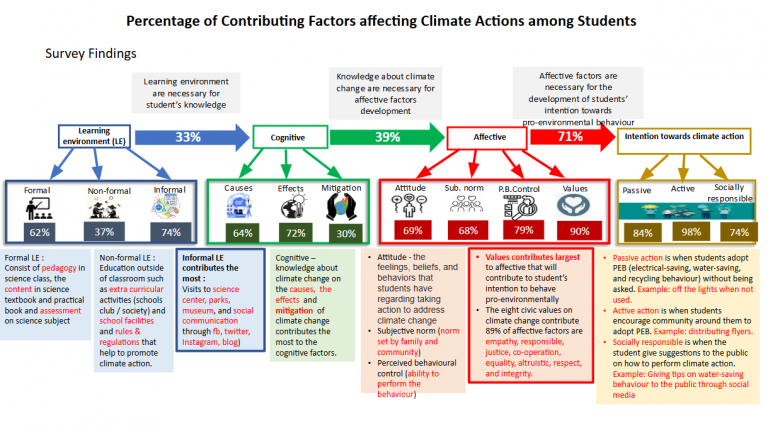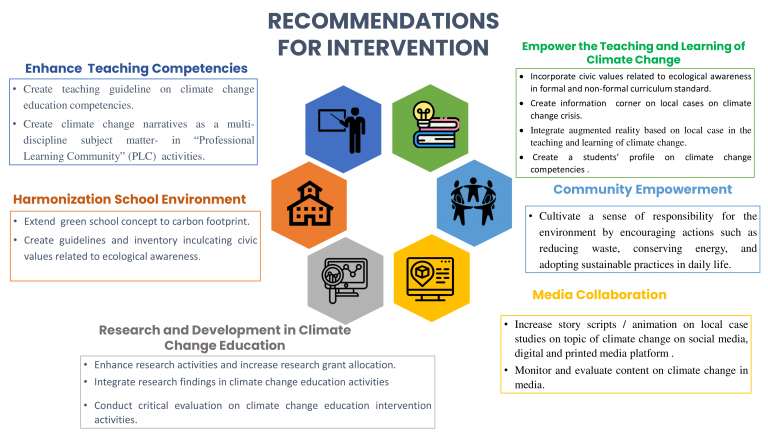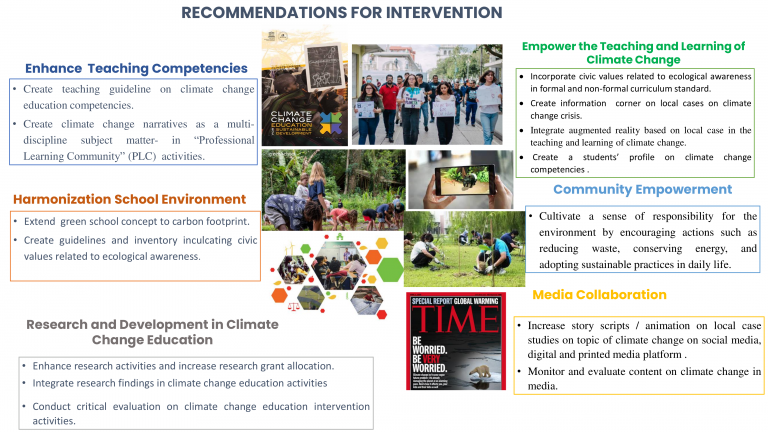The findings of the study show that there is a significant contribution and positive correlation between the path of the learning environment (formal, non-formal, informal) cognitive factors (knowledge) (33%) à affective factors (socio-emotional) (39%) à intention to adopt climate action (71%). The results of the model analysis also show that cognitive factors as well as affective factors play a role as mediators between learning environment factors and the intention to conserve the environment. While it is important to focus on the aspects of learning about climate change, the factors involved in promoting environmental values must be put into consideration.
The support provided by schools, communities and families plays a role in encouraging students to engage in climate action. All stakeholders have a responsibility to contribute towards fostering students’ commitment to reduce the emission of carbon dioxide with regards to mitigating climate change. This can be achieved through classroom education activities formal learning environment that promote non-formal learning as well as utilizing mass media and environmental management facilities for informal learning opportunities. The findings of this study have implications for enhancing conscious behaviour among high school students and offer valuable insights for future research endeavours in this field.
The factors were identified through literature review and interview with experts. Then a consensus from 25 experts on the factors were obtained through Fuzzy Delphi technique. The factors obtained are the learning environment factors (formal, non-formal and informal educations), cognitive factors (the causes, the impacts and mitigation action of climate change), the affective factors (attitude, subjective norm, perceived behavioural control and civic values) and environmental conservation behaviour. The civic values are comprised of values of empathy, respect, cooperation, responsibility, justice, equality, integrity, and altruism. The experts agreed on the 115 items of the factors given out of 130 items. The factors found are used to develop a questionnaire of learning environment factors, cognitive and affective that includes of eight civic values identified towards intention to adopt pro-environment behaviour in the context of mitigation of climate change.
| TEMPORAL COVERAGE | : | December 2019 until November 2023 |
| TEMPORAL FREQUENCY | : | Yearly |
| SPATIAL COVERAGE | : | Malaysia |
| SPATIAL RESOLUTION | : | – |
| VARIABLES | : | – |
| CONTACT PERSON | : | Chan Mee Yeang , P97110@siswa.ukm.edu.my |
| FUNDING INFORMATION | : | TRGS/1/2019/UKM/01/3/4 |
| REFERENCE | : | Noremy Md. Akhir, Ang Wei Lun, Chan Mee Yeang, Norshairani Abd Rahman & Lilia Halim (2022) Establishing the value-psychological-educational dimensions for “learning to action” model for pro-environmental behaviour, Cogent Education, 9:1, 2156748, DOI: 10.1080/2331186X.2022.2156748 |









